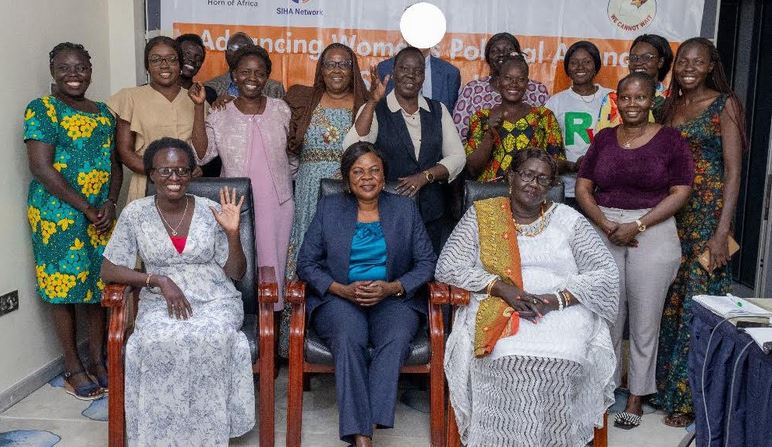A round table on women’s political participation and legislative reforms in South Sudan last week expressed concern about the persistent lack of political will by the parties and the Reconstituted Transitional Government of National Unity (RTGoNU) to enforce the 35 percent affirmative action for women’s representation and to ensure the replacement of women with women in all levels and structures of government.
According to a communique extended to Radio Tamazuj, the women leaders of South Sudan, representing a diverse range of groups and networks including women politicians, civil society members, faith leaders, activists, and women’s rights defenders, convened by the Strategic Initiative for Women in the Horn of Africa (SIHA Network), gathered to discuss the implementation of the Women’s Peace and Security agenda in South Sudan.
“Our focus includes the four pillars: Participation, Protection, Prevention, and Relief and Recovery; the gaps in the development and implementation of the National Action Plan (NAP) 2015-2020 and the draft NAP 2020-2025; draft legislation on Family Law and Anti-GBV bills; and the roles of women, youth, and stakeholders in advancing and protecting the rights of women, girls, and boys,” the communique reads in part.
The women leaders commended President Salva Kiir Mayardiit, and the President of Kenya, H.E. William Ruto Samoei, for their efforts in facilitating peace negotiations through the Tumaini Initiative.
“We recognize the enduring struggle of South Sudanese women for gender equality and their significant role in the quest for lasting peace in South Sudan. We express our concern about the persistent lack of political will by the parties and the Reconstituted Transitional Government of National Unity (RTGoNU) to enforce the 35 percent affirmative action for women’s representation and to ensure the replacement of women with women in all levels and structures of government,” the communique stated. “Condemn the adverse effects of conflict on women, girls, and boys, including displacement, hunger, loss of life and property, and, most critically, sexual and gender-based violence.”
It added: “We are alarmed by recent actions, such as the unilateral removal of the female Deputy Governor and the Mayor of Juba City by the Governor of Central Equatoria State, and the appointment of male Returning Officers by the National Elections Commission, which has further diminished women’s representation.”
The women also note with concern the absence of key principal leaders from the holdout groups led by General Thomas Cirilo and Emmanuel Ajawin in the Tumaini Peace Initiative. They called on the Tumaini Initiative and its mediators to adopt an inclusive, transparent, and people-centered mediation process, including visiting South Sudan to consult with conflict-affected communities, stakeholders, and the broader population to gather their views and experiences.
The meeting called upon the government to expedite the adoption of the National Action Plan (NAP) 2020-2025 and allocate sufficient funding to the Ministry of Gender, Child, and Social Welfare to support its implementation.
“The Ministry of Justice and Constitutional Affairs should present the Bills on Affirmative Action, Family Law, and Anti-GBV to the National Legislative Assembly and hold public hearings to gather input from women’s groups and citizens,” they recommended. “All political parties should adhere to the 35% affirmative action policy for women by appointing more women to leadership positions and cease the practice of replacing women in decision-making roles with men. Prioritize the Tumaini Peace process and address any contradictions between the Tumaini Initiative and the R-ACRSS through political dialogue and national consensus that includes women and civil society organizations.”
The women leaders also urged the government to allocate adequate funding for the implementation of key tasks under R-ARCSS, including the national electoral process, constitution-making, transitional justice mechanisms, security sector, and judicial reform. They also asked the government to allow for civic and political space and reconsider amending the National Security Act 2014 (as amended), as it currently restricts civic and political space, violates fundamental rights under the Bill of Rights of the Transitional Constitution 2011 (as amended), and undermines other government institutions such as the Police, Prisons, Judiciary, and Ministry of Justice and Constitutional Affairs.
The women leaders urged the Government of Kenya to continue engaging with all hold-out groups under the Tumaini Peace Initiative and expedite the mediation process to achieve lasting peace in South Sudan.
They called on the peace partners to provide technical support to the government in implementing peace agreements, including the Tumaini Peace Initiative, the NAP, and Sustainable Development Goal 5 on Gender Equality.
“Support civil society and women’s groups in conducting civic education, promoting dialogue, and peacebuilding and continue supporting resilience and livelihood programs to address humanitarian crises, especially in conflict- and flood-affected communities,” the communique stated. “Support institutional and legislative reform processes by strengthening the capacity of government institutions such as the Police, Prisons, Judiciary, Medical Units, Ministry of Justice and Constitutional Affairs, and Parliament in responding to GBV prevention and response.”
According to the women leaders, the UN should allocate funds to support programs that promote UN Security Council Resolution 1325 through women’s empowerment, protection, and prevention of GBV.
They also urged women’s groups and civil society organizations to conduct nationwide civic education, sensitization, and dialogues on key anti-GBV and Family Law bills.
“This communiqué reflects our collective commitment to advancing women’s political participation and legislative reforms in South Sudan,” the women leaders said. “We urge all stakeholders to act on these recommendations to ensure a more equitable and peaceful future for South Sudan.”




